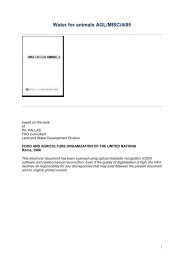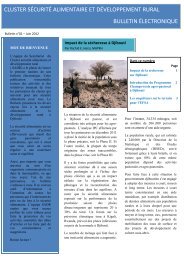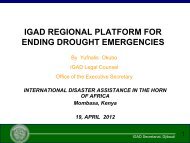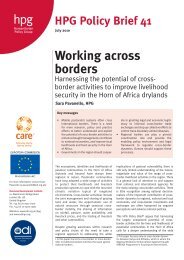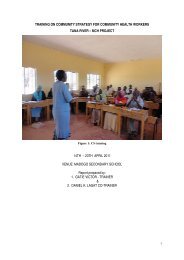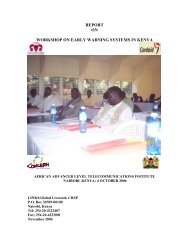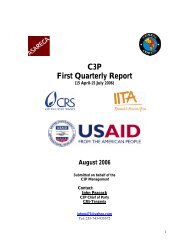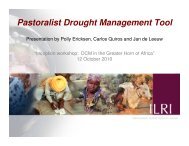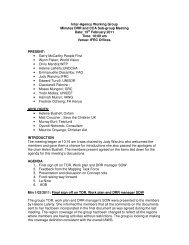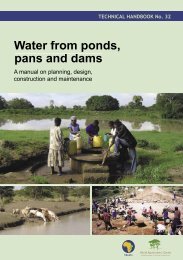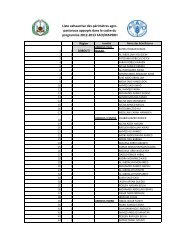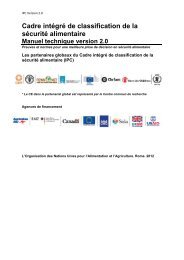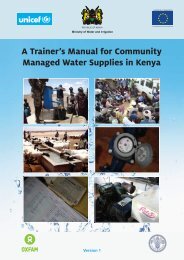3.1.3.1. Highlighted projects, actors, <str<strong>on</strong>g>and</str<strong>on</strong>g> activitiesEngaging with customary instituti<strong>on</strong>s to better inform planning <str<strong>on</strong>g>and</str<strong>on</strong>g> implementati<strong>on</strong> <str<strong>on</strong>g>of</str<strong>on</strong>g> water schemesis emphasized by some NGOs, especially those working <strong>on</strong> l<strong>on</strong>ger term pastoral development. Inadditi<strong>on</strong>, introducing a more l<strong>on</strong>g-term development emphasis to improve emergency reliefinterventi<strong>on</strong>s is also observed am<strong>on</strong>g some d<strong>on</strong>ors, as well as promoting partnerships betweenpractiti<strong>on</strong>ers <str<strong>on</strong>g>and</str<strong>on</strong>g> enhancing coherence in approach. Below are a few examples.The Pastoral Livelihoods Initiative (PLI) 40The PLI, begun in 2005, is implemented by a c<strong>on</strong>sortium <str<strong>on</strong>g>of</str<strong>on</strong>g> internati<strong>on</strong>al <str<strong>on</strong>g>and</str<strong>on</strong>g> local NGOs 41 , in Afar,Somali <str<strong>on</strong>g>and</str<strong>on</strong>g> Oromia (Borana) regi<strong>on</strong>s, funded by USAID 42 . It focuses <strong>on</strong> ‘supporting pastoralists toimprove household livelihood security <str<strong>on</strong>g>and</str<strong>on</strong>g> maintain assets during drought cycles,’ <str<strong>on</strong>g>and</str<strong>on</strong>g> reflectsUSAID’s new emphasis <strong>on</strong> taking a livelihoods-based approach to emergency interventi<strong>on</strong>s. Waterdevelopment under this project is undertaken within a broader l<str<strong>on</strong>g>and</str<strong>on</strong>g>scape c<strong>on</strong>text, recognizing <strong>the</strong>intricate relati<strong>on</strong>ship between water, pasture <str<strong>on</strong>g>and</str<strong>on</strong>g> pastoral mobility. Planning for water developmentinvolves attempting to underst<str<strong>on</strong>g>and</str<strong>on</strong>g> <strong>the</strong> extent <str<strong>on</strong>g>and</str<strong>on</strong>g> quality <str<strong>on</strong>g>of</str<strong>on</strong>g> local rangel<str<strong>on</strong>g>and</str<strong>on</strong>g> resources, users <str<strong>on</strong>g>of</str<strong>on</strong>g> <strong>the</strong>seresources, <str<strong>on</strong>g>and</str<strong>on</strong>g> patterns <str<strong>on</strong>g>of</str<strong>on</strong>g> use. To do this, participatory natural resource mapping is used to benefitfrom pastoralists’ detailed knowledge <str<strong>on</strong>g>of</str<strong>on</strong>g> <strong>the</strong> rangel<str<strong>on</strong>g>and</str<strong>on</strong>g>s, to improve community participati<strong>on</strong> in <strong>the</strong>planning process <str<strong>on</strong>g>and</str<strong>on</strong>g> to reduce <strong>the</strong> risk <str<strong>on</strong>g>of</str<strong>on</strong>g> water related envir<strong>on</strong>mental degradati<strong>on</strong> <str<strong>on</strong>g>and</str<strong>on</strong>g> c<strong>on</strong>flict(Box 12).Box 12: Participatory natural resource mapping – Save <strong>the</strong> Children USAIn 2005, Save <strong>the</strong> Children USA began to use participatory resource mapping to inform its development interventi<strong>on</strong>s inpastoral areas in Oromia <str<strong>on</strong>g>and</str<strong>on</strong>g> Somali regi<strong>on</strong>s. This tool identifies water <str<strong>on</strong>g>and</str<strong>on</strong>g> pasture at <strong>the</strong> level <str<strong>on</strong>g>of</str<strong>on</strong>g> <strong>the</strong> madda* (a Boranaterritorial unit which roughly c<strong>on</strong>forms to <strong>the</strong> boundaries <str<strong>on</strong>g>of</str<strong>on</strong>g> <strong>the</strong> lowest administrative unit, <strong>the</strong> PA). Through thisprocess, customary instituti<strong>on</strong>s involved in local natural resource management are identified. Maps <str<strong>on</strong>g>of</str<strong>on</strong>g> water <str<strong>on</strong>g>and</str<strong>on</strong>g> pastureare produced based <strong>on</strong> community knowledge <str<strong>on</strong>g>of</str<strong>on</strong>g> <strong>the</strong> natural resource base, <str<strong>on</strong>g>and</str<strong>on</strong>g> mobility patterns overlaid based <strong>on</strong>community feedback. Following this exercise, communities <str<strong>on</strong>g>and</str<strong>on</strong>g> PA <str<strong>on</strong>g>of</str<strong>on</strong>g>ficials identify <strong>the</strong> problems related to <strong>the</strong> differentnatural resources, <str<strong>on</strong>g>and</str<strong>on</strong>g> a community acti<strong>on</strong> plan is prepared. For example, if <strong>the</strong>re a problem has been identified with anexisting traditi<strong>on</strong>al water point, a plan is put in place to rehabilitate <strong>the</strong> point (like fortifying cattle troughs <str<strong>on</strong>g>and</str<strong>on</strong>g> wellladders). The entire process closely involves local government, who receive training <strong>on</strong> how to apply <strong>the</strong> tool. In Libendistrict, for example, local <str<strong>on</strong>g>of</str<strong>on</strong>g>ficials are now in a positi<strong>on</strong> to undertake participatory natural resource mapping withoutexternal support. The use <str<strong>on</strong>g>of</str<strong>on</strong>g> this tool has also been promoted am<strong>on</strong>g all PLI c<strong>on</strong>sortium members, broadening itsapplicati<strong>on</strong>.* Participatory resource mapping is currently being explored for <strong>the</strong> dheedha level, which is <strong>the</strong> largest Boranaterritorial unit crossing <strong>the</strong> boundaries <str<strong>on</strong>g>of</str<strong>on</strong>g> several PAs. This is to better underst<str<strong>on</strong>g>and</str<strong>on</strong>g> broader mobility patterns which canaffect <str<strong>on</strong>g>and</str<strong>on</strong>g> be affected by water development interventi<strong>on</strong>s.The PLI c<strong>on</strong>structs water points, but major focus is also put <strong>on</strong> rehabilitating existing <strong>on</strong>es to build<strong>on</strong> what is already <strong>the</strong>re, as well as training <str<strong>on</strong>g>and</str<strong>on</strong>g> c<strong>on</strong>tracting local mas<strong>on</strong>s in water pointrehabilitati<strong>on</strong>. Making <strong>the</strong> most <str<strong>on</strong>g>of</str<strong>on</strong>g> what is already in place is a cost effective means <str<strong>on</strong>g>of</str<strong>on</strong>g> improvingwater supply <str<strong>on</strong>g>and</str<strong>on</strong>g> allows partners to avoid <strong>the</strong> risks associated with new infrastructure. Training localmas<strong>on</strong>s embeds a local cadre <str<strong>on</strong>g>of</str<strong>on</strong>g> expertise <str<strong>on</strong>g>and</str<strong>on</strong>g> <strong>the</strong>reby reduces dependence <strong>on</strong> external assistance.40 This project is currently in its sec<strong>on</strong>d phase, PLI II, which runs from 2009-2013.41 This includes two <str<strong>on</strong>g>of</str<strong>on</strong>g> <strong>the</strong> partners who supported <strong>the</strong> producti<strong>on</strong> <str<strong>on</strong>g>of</str<strong>on</strong>g> this review.42 NGO partners in Phase I included Save <strong>the</strong> Children USA, Save <strong>the</strong> Children UK, <strong>the</strong> Internati<strong>on</strong>al RescueCommittee (IRC), <strong>the</strong> Agricultural Cooperative Development Internati<strong>on</strong>al/Volunteers in OverseasCooperative Assistance (ACDI/VOCA), <strong>the</strong> Global Livestock Collaborative Research Support Program under<strong>the</strong> Pastoral Risk Management project (GL-CRSP PARIMA), Tufts University, CARE Internati<strong>on</strong>al, <strong>the</strong> UnitedStates Forest Service (USFS), <str<strong>on</strong>g>and</str<strong>on</strong>g> Acti<strong>on</strong> for Development (AFD) as well as o<strong>the</strong>rs.62
Fur<strong>the</strong>rmore, attenti<strong>on</strong> is given to scheme management to ensure equitable access <str<strong>on</strong>g>and</str<strong>on</strong>g>representati<strong>on</strong>. The PLI also focuses <strong>on</strong> o<strong>the</strong>r development needs in <strong>the</strong> rangel<str<strong>on</strong>g>and</str<strong>on</strong>g>s, includingveterinary health <str<strong>on</strong>g>and</str<strong>on</strong>g> access to markets.A review <str<strong>on</strong>g>of</str<strong>on</strong>g> <strong>the</strong> PLI found that “future USAID-funded water development programs should c<strong>on</strong>siderrequiring communities to make cash c<strong>on</strong>tributi<strong>on</strong>s for water point c<strong>on</strong>structi<strong>on</strong>/rehabilitati<strong>on</strong>. Thiswould encourage <strong>the</strong> growth <str<strong>on</strong>g>of</str<strong>on</strong>g> <strong>the</strong> private sector c<strong>on</strong>structi<strong>on</strong> businesses in pastoral regi<strong>on</strong>s.”Since this recommendati<strong>on</strong> was made, Save <strong>the</strong> Children USA’s pastoral programs have requiredcommunity c<strong>on</strong>tributi<strong>on</strong>s to water development. For example, in <strong>the</strong> case <str<strong>on</strong>g>of</str<strong>on</strong>g> de-silting p<strong>on</strong>ds, aminimum <str<strong>on</strong>g>of</str<strong>on</strong>g> 40 per cent community c<strong>on</strong>tributi<strong>on</strong> is required. The organizati<strong>on</strong> has learned that costrecovery is much more possible where customary instituti<strong>on</strong>s prioritize <strong>the</strong> interventi<strong>on</strong>, organize<strong>the</strong> labour <str<strong>on</strong>g>and</str<strong>on</strong>g> carry out <strong>the</strong> work. Importantly, <strong>the</strong>y also take resp<strong>on</strong>sibility for maintenance, aswater points in pastoral areas – wells particularly – are invariably managed by customary instituti<strong>on</strong>s.The PLI is <strong>on</strong>e <str<strong>on</strong>g>of</str<strong>on</strong>g> <strong>the</strong> first initiatives to build partnerships between different NGOs in an attempt toharm<strong>on</strong>ize approaches to development <str<strong>on</strong>g>and</str<strong>on</strong>g> community engagement. It also emphasizes coordinati<strong>on</strong>between NGOs <str<strong>on</strong>g>and</str<strong>on</strong>g> government 43 . Project staff works closely with Woreda Water ResourceDevelopment Offices to identify water points in need <str<strong>on</strong>g>of</str<strong>on</strong>g> rehabilitati<strong>on</strong>, <str<strong>on</strong>g>and</str<strong>on</strong>g> organizes workshops tobring toge<strong>the</strong>r NGOs, grassroots community groups <str<strong>on</strong>g>and</str<strong>on</strong>g> local government. Additi<strong>on</strong>ally, TuftsUniversity organizes regi<strong>on</strong>al technical coordinati<strong>on</strong> meetings in Afar <str<strong>on</strong>g>and</str<strong>on</strong>g> Oromia as a forum forc<strong>on</strong>sortium members to inform local government <strong>on</strong> project progress, <str<strong>on</strong>g>and</str<strong>on</strong>g> to harm<strong>on</strong>ize practice<str<strong>on</strong>g>and</str<strong>on</strong>g> approach between government initiatives <str<strong>on</strong>g>and</str<strong>on</strong>g> <strong>the</strong> PLI (PLI/ENABLE Afar Regi<strong>on</strong> TerminalReport, 2008). Fur<strong>the</strong>rmore, close linkages with <strong>the</strong> Livestock Policy Forum under <strong>the</strong> MoARD hasshown to be a highly effective way for <strong>the</strong> project to communicate less<strong>on</strong>s learned in <strong>the</strong> field <str<strong>on</strong>g>and</str<strong>on</strong>g> tobring to <strong>the</strong> table approaches which have been shown to work in <strong>the</strong> pastoral c<strong>on</strong>text for <strong>the</strong>benefit <str<strong>on</strong>g>of</str<strong>on</strong>g> a wide audience.A fur<strong>the</strong>r crucial value provided by <strong>the</strong> PLI experience is <strong>the</strong> use <str<strong>on</strong>g>of</str<strong>on</strong>g> impact assessments, pi<strong>on</strong>eeredby Tufts University, to gauge <strong>the</strong> impact <str<strong>on</strong>g>of</str<strong>on</strong>g> interventi<strong>on</strong>s <strong>on</strong> livelihoods. The PLI is <strong>the</strong> first project in<strong>the</strong> rangel<str<strong>on</strong>g>and</str<strong>on</strong>g>s to do this.Regi<strong>on</strong>al Drought Preparedness ProgramBegun in 2007 <str<strong>on</strong>g>and</str<strong>on</strong>g> funded by <strong>the</strong> European Commissi<strong>on</strong>’s humanitarian aid organisati<strong>on</strong> (ECHO), <strong>the</strong>Regi<strong>on</strong>al Drought Preparedness Program, under <strong>the</strong> Regi<strong>on</strong>al Drought Decisi<strong>on</strong> (RDD), is ano<strong>the</strong>rexample <str<strong>on</strong>g>of</str<strong>on</strong>g> emergency interventi<strong>on</strong>s with a livelihoods based emphasis in <strong>the</strong> rangel<str<strong>on</strong>g>and</str<strong>on</strong>g>s. It alsoillustrates a fur<strong>the</strong>r case <str<strong>on</strong>g>of</str<strong>on</strong>g> bringing disparate actors toge<strong>the</strong>r to work towards a comm<strong>on</strong> goal. TheFood <str<strong>on</strong>g>and</str<strong>on</strong>g> Agriculture Organizati<strong>on</strong> (FAO) coordinates <strong>the</strong> Regi<strong>on</strong>al Drought Preparedness program,with access to water for humans <str<strong>on</strong>g>and</str<strong>on</strong>g> livestock a prominent <strong>the</strong>me. Priority is given to traditi<strong>on</strong>al,affordable technologies familiar at <strong>the</strong> local level (Schimann <str<strong>on</strong>g>and</str<strong>on</strong>g> Philpott, 2007). ECHO partnersinclude DanChurchAid (DCA), SC-UK, Acti<strong>on</strong> C<strong>on</strong>tre La Faime (ACF), Vétérinaires Sans Fr<strong>on</strong>tières(VSF), FARM AFRICA, Cooperazi<strong>on</strong>e Italiana (COOPI), Caritas/HCS, CordAid, <str<strong>on</strong>g>and</str<strong>on</strong>g> Oxfam GB.The program emphasizes strategic distributi<strong>on</strong> <str<strong>on</strong>g>of</str<strong>on</strong>g> water points to open up existing pasture, asopposed to rehabilitating heavily degraded areas, which requires more time than <strong>the</strong> 18 m<strong>on</strong>thsavailable for <strong>the</strong> project. In order to correctly distance <str<strong>on</strong>g>and</str<strong>on</strong>g> place water points, focus is placed <strong>on</strong>mapping existing water infrastructure as well as <strong>the</strong> physical attributes <str<strong>on</strong>g>of</str<strong>on</strong>g> an area. Mapping waterpoints is meant to improve planning <str<strong>on</strong>g>and</str<strong>on</strong>g> “facilitate <strong>the</strong> strategic spatial distributi<strong>on</strong> <str<strong>on</strong>g>of</str<strong>on</strong>g> water points,settling resources-linked c<strong>on</strong>flicts <str<strong>on</strong>g>and</str<strong>on</strong>g> rehabilitating rangel<str<strong>on</strong>g>and</str<strong>on</strong>g> potential” to improve productivity <str<strong>on</strong>g>and</str<strong>on</strong>g>livelihoods (Schimann <str<strong>on</strong>g>and</str<strong>on</strong>g> Philpott, 2007: 8).43 The PLI project helped inform rangel<str<strong>on</strong>g>and</str<strong>on</strong>g> management planning for <strong>the</strong> Oromia Growth Corridors Initiative,where PLI guidelines for <strong>the</strong> c<strong>on</strong>trolled burning <str<strong>on</strong>g>of</str<strong>on</strong>g> rangel<str<strong>on</strong>g>and</str<strong>on</strong>g>s were used.63
- Page 1 and 2:
Synthesis
- Page 4 and 5:
TABLE OF CONTENTSLIST OF ACRONYMS..
- Page 6 and 7:
ACKNOWLEDGMENTSI would like to exte
- Page 8 and 9:
LIST OF ACRONYMSACDI/VOCAACFAFDCDDC
- Page 10 and 11:
EXECUTIVE SUMMARYWater development
- Page 12 and 13: understanding <str
- Page 14 and 15: Agreed upon guidelines for water de
- Page 16 and 17: • Make better use of</str
- Page 18 and 19: to inform their own work an
- Page 20 and 21: Within pastoral areas, it is recogn
- Page 23 and 24: Section 2. Overview of</str
- Page 25 and 26: Dohrn, 2006). Spatially variable ra
- Page 27 and 28: The following broad overview touche
- Page 29 and 30: In areas of adequa
- Page 31 and 32: observed response was for individua
- Page 33 and 34: Specific to water development, seve
- Page 35 and 36: Section 3. Water development todayT
- Page 37 and 38: Eliciting payments for water from l
- Page 39 and 40: ureaus 25 . The ministry’s interv
- Page 41 and 42: National policy paints a conflictin
- Page 43 and 44: will be given to pastoralists to en
- Page 45 and 46: Water supplyGovernance and<
- Page 47 and 48: vulnerable to conversion for other
- Page 49 and 50: • Agro-pastoralists’ priorities
- Page 51 and 52: Although the WSDP principles are se
- Page 53 and 54: The Universal Access ProgramThe Uni
- Page 55 and 56: • Help ensure that public works d
- Page 57 and 58: However, the development model for
- Page 59 and 60: Figure 4: Proposed pilot la
- Page 61: Many international and</str
- Page 65 and 66: CARE International, under the GWI,
- Page 67: and traditional me
- Page 70 and 71: • Understand exi
- Page 72 and 73: 4.2 Key observations in the water d
- Page 74 and 75: epresent a firm attempt to preserve
- Page 76 and 77: learning from NGO experiences in Bo
- Page 78 and 79: However, there are currently no spe
- Page 80 and 81: 4.3 Conclusion, ways forward <stron
- Page 82 and 83: In sum, pastoralism as a livelihood
- Page 84 and 85: • Water interventions selected sh
- Page 86 and 87: • Promote effective participation
- Page 88 and 89: Gebre-Mariam, A. (1982). Organizati
- Page 90: Schimann P. and Ph



